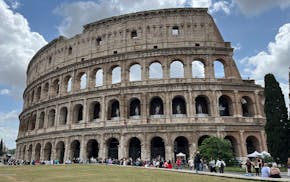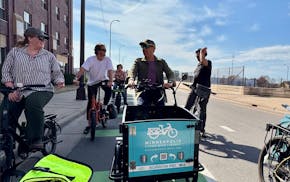Before Minneapolis decides the future of the Hiawatha golf course, Darwin Dean wants the city to understand its history.
This public golf course, dredged out of a lost lake almost a century ago, was a refuge.
In a city that redlined Black families out of entire neighborhoods and ran highways through Black business districts, Hiawatha was a green space where Black golfers of the 1930s and onward could play through in peace — so long as they abided by the whites-only rule at the clubhouse.
"This is one of the most diverse golf courses that you will find within the Twin Cities area," said Dean, president of the Upper Midwest Bronze Amateur Memorial Golf Tournament, who has spent years trying to talk the Minneapolis Park Board out of its plans for Hiawatha.
He wants to save this golf course — all 18 holes of it — for the generations that love playing there now, and the generations to come. The students from neighborhood high schools; the children who come to compete in the annual tournament he hosts at Hiawatha. Golf, he said, teaches you practical skills like geometry and the mathematics of scorekeeping, and intangible skills, like fair play, persistence and networking.
"It's a game of honor," Dean said. "It enables you, for four hours, to move along, compete with someone and get to know them. I'm trying to save the golf course for the youth of tomorrow."
Then there are the history lessons you only learn when you walk the greens where Solomon Hughes once played.
Hughes, a blazingly talented golfer, spent his career competing in segregated tournaments. In 1948, he and some of the best players in the Twin Cities sent in their entry fee to compete in the St. Paul Open, which was being played on a public golf course. The entry fees were returned.
The open was open only to PGA members. PGA memberships were open only to white people.
Those greens can't be saved, the Park Board has warned. Not all of them.
In addition to everything else Minneapolis got wrong in the 1930s, the parks department decided to drain the Rice Lake watershed; pile the mushy sediment up in one corner to make a golf course; then dig a big hole next to it to create Lake Hiawatha. Today, the golf course — already sunk low in the south Minneapolis watershed — sits lower than Lake Hiawatha. Engineers have to pump enough water out of the ground to hydrate a small city just to keep the golf course dry.
"What we're trying to do is achieve a balance of ecology and recreation," said Michael Schroeder, assistant superintendent for planning at the Park Board, who is working to undo some of the havoc Theodore Wirth and the Park Board wreaked on the city's geology, geography and ecology in the early 20th century.
In addition to Frankensteining a lake into a golf course, Wirth straightened Minnehaha Creek to make it more "picturesque" and fiddled with the lake levels of Bde Maka Ska, Cedar Lake and Lake of the Isles to make it easier for boats to float from one to the next. Planners hope to restore the creek's natural wiggle someday.
For years, the Park Board has reviewed proposals to restore part of the watershed around Hiawatha while still preserving the park for the public to enjoy.
Next week, the board will hold the latest of many public hearings on the updated master plan for the site: a lovely park with new playgrounds, green space, an updated restaurant with a dog patio, cross-country ski and bike trails, canoe and kayak launches, wetlands for stormwater management — and a scaled-back nine-hole golf course.
"What we don't want to do is suggest that golf isn't important," Schroeder said. But there are half a dozen public golf courses in the park system and so planners decided to focus on "creating a better nine-hole golf course."
Half a course isn't good enough for Dean, who has watched his community settle for less for far too long. Yes, there are other golf courses around town, but none are close enough to be convenient for the student golfers at Roosevelt or South High. You can't host a golf tournament on half a golf course. You can't point to the fairways Solomon Hughes once played if they're submerged under wetlands.
The Park Board wants to save Hiawatha. So does Darwin Dean.
If you'd like to listen to what they have to say, the next public hearing on the Hiawatha Golf Course Master Plan will be broadcast at 6:30 p.m. Feb. 17. For more information, go here.

Brooks: America mints its last penny. What's the new going rate for our thoughts?

Brooks: From big beavers to little bears, meet Minnesota's newest state symbols

Brooks: Kristi Noem's 'Hunger Games'? It could actually happen.

Brooks: Will American tourists abroad be welcome, or at least tolerated? I found out.


